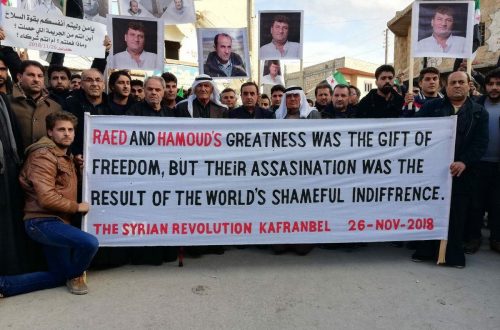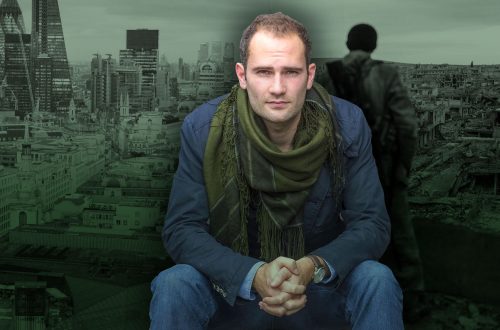Guest post by DaveM
At the beginning of the new year Lizzie Phelan went to Damascus and gushed on state TV about how much Syrians love Bashar al-Assad and how the international media got it totally wrong about Syria because she didn’t encounter any problems walking around the centre of Damascus.
Her Wiki page states she’s reported for Russia Today, Press TV and the Voltaire Network.
According to the Voltaire Network she claimed that a Western backed genocide was taking place in Libya although the youtube clip has subsequently been removed.
Press TV as we know is the English-language mouthpiece for the Iranian regime, and the Voltaire Network is run by 9/11 troofer Thierry Meyssan, who has himself appeared on Syrian State TV.
This is what Lizzie had to say for herself when she was in Syria.
Syria TV News presenter: ‘British Journalist Lizzie Phelan arrived in Syria nearly a week ago and spoke about what she had witnessed and about her impressions [of Syria and what’s happening].’
Lizzie Phelan: ‘I arrived in Damascus six days ago and came here in my capacity as a journalist from England. I was very surprised when I saw the situation here, this is because [in the UK] I followed what was happening in Syria via the mass media. A picture had formed for me just as it had for most of the people in England in that chaos is widespread throughout the entire country, that it isn’t a safe country, that the army are deployed in the streets, and that there are demonstrations against the government being held every day and everywhere in the country.
‘So I was very surprised when I arrived 6 days ago and found out that live was carrying on here as normal.
‘There were some problems which we saw, however everybody was going to their jobs and schools. The city is very safe. Sometimes I’d walk around on my own and even late at night and I didn’t come across any problem.
‘And as of yet I haven’t seen any large scale demonstrations against the government. In fact I saw a large demonstration in support of the government during the last two days in Umayyad Square.
‘As I said I was surprised because I saw that the reality was completely different from what was being said in the West, America and other countries.’
Syria TV News presenter: ‘And in answering a question about the demonstration in Umayyad Square and how president Bashar al-Assad went into the square and spoke to the people, the journalist Phelan answered…’
Lizzie Phelan: ‘I think it was of great interest when his excellency president Bashar al-Assad attended the demonstration with the people two days ago and spoke to them. This to me shows that the media such as the BBC or Al Jazeera say that the people don’t support Bashar al-Assad. However in reality he went into a square in [amongst] the enthusiasm of thousands of people. I saw that the people were very happy to see him and expressed their affection and support for him.
‘He went there with his wife and children without any concerns for his safety. These aren’t the actions of a president who doesn’t have a huge amount of popularity. That was my impression.’
Phelan, as you may recall, was “reporting” from Tripoli last August when the anti-Gaddafi rebels were taking control of the city, blandly assuring the Russia Today audience that Gaddafi’s forces were firmly in control and beating back the rebels. While in Tripoli, she also reported that Gaddafi’s forces had retaken control of the city of Misrata– a pure fabrication.
While Lizzie Phelan was in Syria so was Gilles Jacquier, not just Damascus but also in Homs. He worked not for Press TV, RT or the Voltaire Network but for France 2, having won the country’s most prestigious journalism prizes. Sadly he became the first foreign journalist killed in Syria since the uprising began.
He was killed by mortar fire in very suspicious circumstances. The Committee to Protect Journalists were among the first to report this. This CPJ article also deals with the ethical difficulties faced by journalists when embedded with a totalitarian regime which has no qualms about killing its own people (including its journalists) against the need to cover events on the ground.
It’s worth reading in full.
Some journalists had refused the invitation because they feared they would get a slanted view of the violence or would be used as stooges for the government’s propaganda in Syria. Others went, convinced it was a rare opportunity to get into the country and cover the troubles, at least from the official side. Since the beginning of the revolt international journalists have tried to enter Syria, but soon after the first signs of unrest redolent of a revolution, the government had imposed a nearly complete blackout on the media and rejected most visa applications from Western journalists. (Local journalists, meanwhile, have been detained, gone missing, or turned up dead). The only alternatives were sneaking into the country either on a tourist or business visa, or crossing from Lebanon and going underground or “embedding” with rebel units. Only recently did Damascus start issuing short-term visas for a limited number of journalists, who are allowed to move around only when escorted by official minders.
…..
On Friday, France Télévisions news director Thierry Thuillier added to the suspicions when he said in an interview that Gilles Jacquier and his cameraman “had not wanted to go to Homs” and had been told they would have “to leave Syria immediately if they refused to go there.”“For us, this scenario raises many questions about the origin of the shots, the target aimed at,” added Thuillier. “These journalists were part of a convoy under an escort – very tightly contained. When the firing started, the Syrian soldiers backed away, leaving the journalists exposed and alone. Why? I don’t have the answer. The editorial staff, France Televisions (and) the families want this answer.”
The French authorities are determined to know what happened. On Friday, a Paris prosecutor launched a preliminary murder investigation into the killing. French Foreign Minister Alain Juppé asked for a thorough and independent probe, and received the full backing of Sarkozy, who in a strong and emotive address paid tribute to Gilles Jacquier and highlighted “the importance of having, in regimes and situations like these, courageous people that are committed to tell the truth of what is happening.”
I very much doubt France Television and Jacquier’s family will get an answer and certainly not while Assad is still in power. The families of over 6,000 dead would also like answers, as would the relatives of the missing, who don’t even know if their loved ones are alive or dead.
Still, at least Lizzie had a nice time when she was there.


